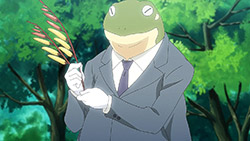 |
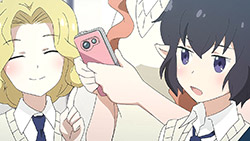 |
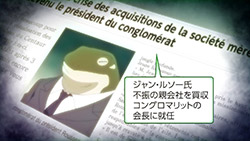 |
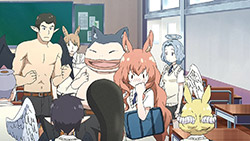 |
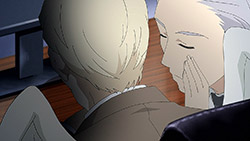 |
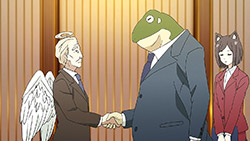 |
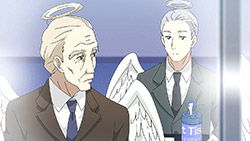 |
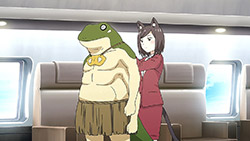 |
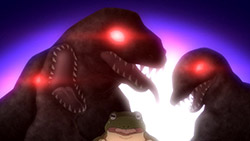 |
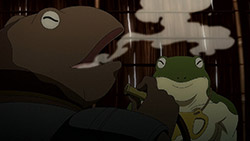 |
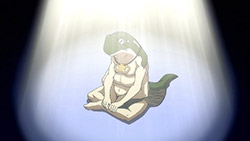 |
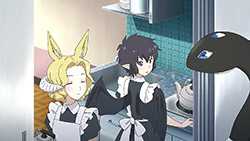 |
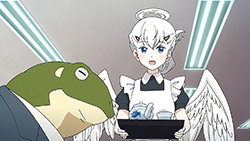 |
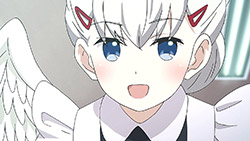 |
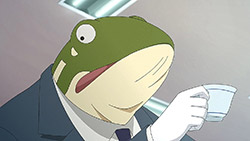 |
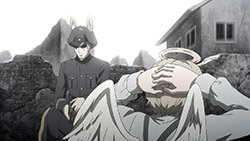 |
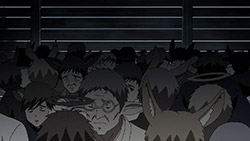 |
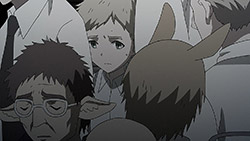 |
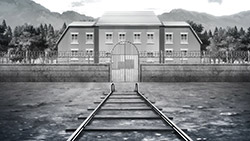 |
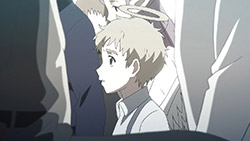 |
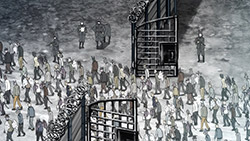 |
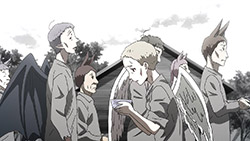 |
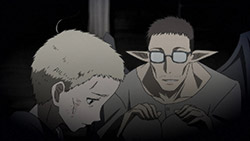 |
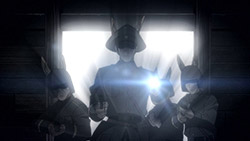 |
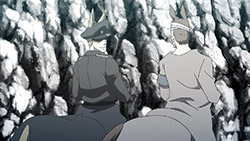 |
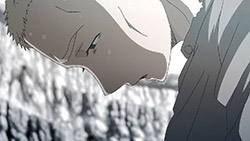 |
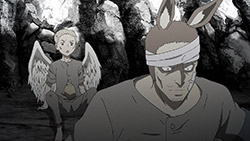 |
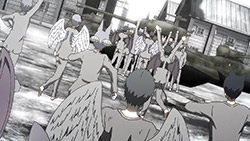 |
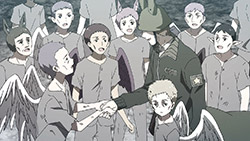 |
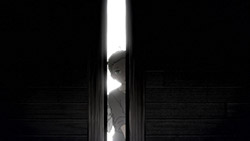 |
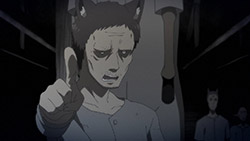 |
 |
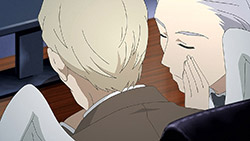 |
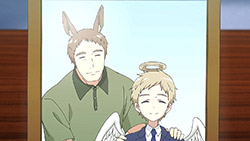 |
 |
 |
「世間で偉人って言われている人の苦悩って. / 世間で偉人って言われている人の人生って.」 (Seken de Ijintte Iwarete Iru Hito no Kunoutte. / Seken de Ijintte Iwarete Iru Hito no Jinseitte.)
“What Are the Struggles of Someone Known as a Prominent Figure? / What Is the Life of Someone Known as a Prominent Figure Like? “
I never thought I would cover an anime that took a serious look into the pain, horror, and lingering effects of the Holocaust, nor would I have expected an anime to examine the lives of those who have survived and died in concentration camps. Even with centaurs, angels, and demons being thrown into these camps by centaur Nazis, it’s still able to evoke the living hell that the Jewish population and races that were victim to Hitler’s hatred had gone through. Depicting a particular survivor’s life in the camp emphasizes the impact that wide-scale racial violence has had in this universe to the point that many countries agreed to rehaul their laws against prejudice to prevent any such atrocities from happening in the future.
Additionally, this survivor’s interaction with a bespectacled prisoner helps reflect on how racial strife is internalized behavior that is emboldened through what society teaches people about race. Much of the fear bred in the series is through misunderstanding one another (such as with Himeno’s fear of Antarcticans being bred from watching an old racist horror movie as a child), and while the Holocaust is a massive leap from contemporary microaggressions like being scared of a race because of a horror movie, the influence that a tyrannical figure has with emboldening and empowering prejudice on a wide scale had made it possible for the Nazi ideology to have spread, especially in this universe where characters to this day live under the constant reminder of what racial atrocities their family, relatives, and ancestors were either involved with as victims or perpetrators. It would make a re-watch of the series intriguing since tying together many of these races with traumatic historical events they were a part of would inform us on how interactions between different races are informed through the collective knowledge of their racial histories.
The episode was poetic in its story-telling when we learn that the young boy we follow in the concentration camp grew up to be the president who is shaking the hands of Jean Rousseau near the beginning of the episode. It was very effective in striking an emotional chord with me, especially after thinking back to the scene where he criticizes his aid for trying to give him a tissue to wipe his hands after his handshake with an Amphibianfolk. His struggles with prejudice as an older man also mirrors on the struggles that Rosseau has as the president of a French conglomerate who had been adopted and raised as a Frenchman (apologies to our French readers who have to contend with the show making their French character a frog). His troubles are more along the lines of trying to be a mediator between Amphibianfolk and Mammals in preventing a race war from breaking out in his homeland. In the process of trying to mellow out the rising tensions, the leader of the Amphibianfolk tribe he originated from accuses him of not understanding their point-of-view as he was raised by the same Mammal-based species that they are in opposition to.
It differs heavily from the racial strife the angel president went through, but lends itself to the conversation that unfortunately, racial strife continues to follow everyone in history even with such strict laws. This was the heaviest episode yet with very little of the SOL aspects of the school life scenes, but I’m curious as to what effect revealing the information has on the rest of the series, or if there will be other characters who were involved or related to people involved in historic events such as Himeno’s ancestors. Episode 09 was hard to watch with how intense the scenes in the camps were, but it resonates with the main message of the series to use our knowledge and acknowledgement of how our history of racially-motivated violence and horrors lends itself to how we see the present and future.

We have been seeing hints of these events through the series, reeducation camps, officers in the hallway while the teachers are teaching, and mandatory coverage in magazines. The bespectacled man in this episode summed it up by saying that regardless of what controls we put on society, society will always never be truly equal, we are all individual people and the grass is always greener somewhere else. The president learned that lesson the hard way and that is why he chided his aid by saying his hand wasn’t dirty. It is also a lesson that Mr Rousseau is coming to terms with. A heavy episode with a good lesson.
I found it interesting how the anime goes overseas when it didn’t really need to. There were plenty of Japanese concentration camps and hard-labor camps in WWII. Relatives of mine spent time in them.
Let’s stop it right there before it gets more political, this is not the place to talk about politics.
McFate’s point is valid and this is a very political episode, so surely we can talk about politics if we want as long as we keep things relevant and respectful.
@Angelus : There are always people out there that can’t do that, it is why I suggested that we stop this argument right now before it gets out of hand later. It’s not the place to talk about it.
@MCFATE. You bring up an interesting point. I think they focused on the Jewish Holocaust because of the french character and to show how the races are viewed in other countries. I know that it is not covered as much but hopefully in this instance it is not to cover up some harsh truths. I know that the MC’s live in Japan but are all the other countries as strict on racial equality. I feel that this show and Interviews with Demi girls give an interesting look at racial inequality, stereotypes and how to deal with them in a way that makes people more open to discussion. I was moved when Sussul said that he was french. People were obsessed with his ancestry instead of his nationality. Being a black american I can relate all to well. More than 7 generations American and still some would refuse to acknowledge that although I have had a Jamaican coworker call me a Yankee. Very fitting since I am from up north.
This occurred to me as well. It wouldn’t be the first time this show has appeared to veer away from criticism of Japanese historical behavior (the other being the reference in ep6 to the 16th century Portuguese/Japanese slave trade).
That said, I get the impression the allusions in this episode aren’t limited to the Holocaust and European colonialism. The Godzilla-like appearance of the amphibian village’s gods is curious; Godzilla is normally a metaphor for nuclear weapons, not a deity. That primitive amphibian village may refer to a certain backward country that recently obtained nuclear weapons, one with which Japan does have a history of forced labor.
This episode illustrates the manga’s tonal whiplash, where the themes could simply change just like that between chapters.
From a SOL chapter with Hime & friends, the mangaka would suddenly shift gears into a sociopolitical/racial commentary chapter (like this one), go into Antartican conspiracies the next, then return to SOL once more.
Apparently it’s why the original fantranslators refused to continue doing the manga (apart from the official licensing).
http://i0.kym-cdn.com/photos/images/newsfeed/000/173/576/Wat8.jpg?1315930535
… Slice-of-life!! Moe girls! Kissing!! Hugging! Fluffy fluffy times!
Sadly, a lot of comments on the episode I’ve seen on various sites show people REALLY haven’t been “watching” the series; complaining about this episode “coming out of nowhere”, wondering what the point of the episode was, and so on.
I wasn’t sure how far they’d go on whether they’d discuss the Holocaust, but the backbone of this series is highlighting the effects of history’s brutal history racism and prejudice, and how events this heinous would push society to seek a strictly equal society.
It’s like some viewers tuned out when the show had a history lesson on centaur enslavement a couple episodes ago. It’s always had that back-and-forth tonal shift between SOL antics and the dystopian society created through legally enforced tolerance. They must’ve been half-asleep watching the past couple episodes to act like this was coming out-of-nowhere.
I like the fact that they link what is going on in society with the characters lives. It frames how they interact and gives insight to them overall.
a FURRY holocaust. and with a DISCLAIMER no less….well played Anime, well played.
hmmm i remember there’s one race that extinct..weretiger? werewolf? i forgot, can it be that they got annihilated by other race? wow makes me depressed…
Tiger-centaur
Show Spoiler ▼
So after what happened to the merfolk’s ritual, presumably we can assume that the amphibianfolk’s “god” is also a product of the Antarctican Animatronics Corporation?
https://randomc.net/image/Centaur%20no%20Nayami/Centaur%20no%20Nayami%20-%2009%20-%20Large%2023.jpg
Don’t do it Tucker! Not another Nina, wait a sec she might fit in here.
https://randomc.net/image/Centaur%20no%20Nayami/Centaur%20no%20Nayami%20-%2009%20-%20Large%2009.jpg
I Wonder what those frog people are serving…who knows, one day that Crettin will…UGH!
I Mean Seriously…i wonder if that has some a little involvement of it.
This isn’t supposed to be mysterious. It’s intended to be obvious that the Antarcticans are supporting the Amphibianfolk and acting as their “god.”
When the first half of the episode features a frog-man (and I’m assuming African analog?) having to deal with the racial prejudices of his adopted society as well as facing the specter of his own people being manipulated into war… you kind of expect that to be the DOWNER part of the episode before they finish things off with an upbeat return to cute girls doing cute things.
What you DON’T expect is that to be the upbeat part of the episode before moving on to “Hey! Remember the holocaust?”
I also assume African, but it could also be someone from the Amazonas delta… Because there are french Missioner, and in South America there is a Country with a France connection…
Yeah, this “side character” could push aside the entire MC Cast, and Part B… Oh Well
Centaur no Nayami:
Come for the cute demi-human girls.
Stay for the Nazi holocaust.
You thought it was just cute girls. You thought wrong. Welcome to life.
https://randomc.net/image/Centaur%20no%20Nayami/Centaur%20no%20Nayami%20-%2009%20-%20Large%2031.jpg
Welcome to the most frustrating thing about this show/manga: how fucking bipolar it is. This is why we dropped it. It goes from super interesting shit like geopolitical climates to “hey what color is your vagina?”
The author can’t keep his focus on shit.
Don’t want to be disrespectful, but I’m getting lost interest in this series thanks to the loss of the main focus; you don’t call a series “Centaur no Nayami” to divide the attention in the whole cast, even sometimes putting Hime in the sidelines. The new episode did the same thing, so if they wanted to do a series of monster-folk, called it properly.
Sorry for my personal rant, but that’s the way I feel.
like the ED… Its focused on the Angel Nee-tan.. But why? is she the Main Actor of this Show? no… As i said, many “side characters” has to much power to cast the Main Actors aside..
My Conclusion:
This Anime is like the Mobile Games nowadays. All Episodes are standalone of themselves. But Slice of Life only can become boring, so they use “moe” and “kawaii” to compesate it…
Like Lucky Star…
This Anime can not hold their viewers from start to finish.. No “red line”, no goal, no arc? as if random direction is their target…
So Choya, have you stopped covering the series? I don’t see your review for episodes 10 and 11…
It’s coming up. My power went out when Irma hit so I’m doing a post on 10 & 11 to make up for missing it.